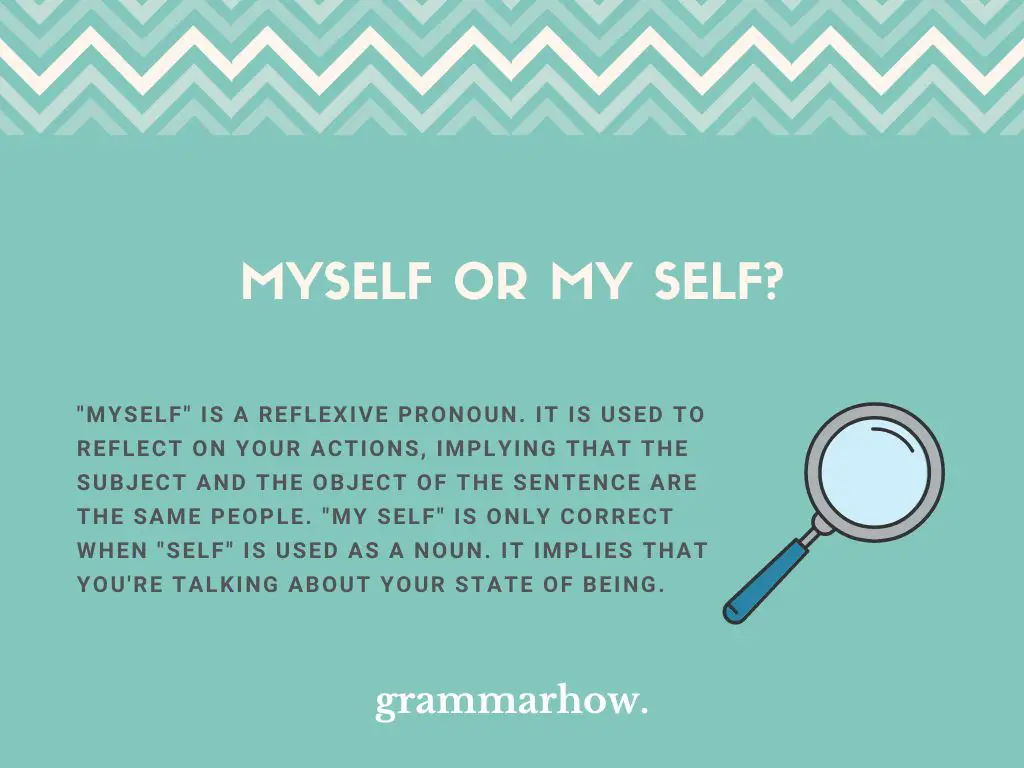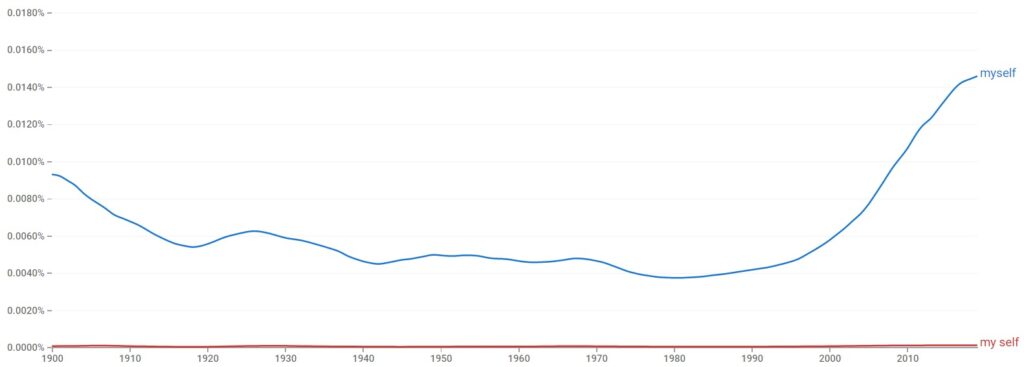“Myself” is a reflexive pronoun used to talk about something you do yourself. However, “my self” is sometimes used in its place. This article will explore the differences between the two phrases and help you understand when to use which one.
Myself or My self?
“Myself” is a reflexive pronoun. It is used to reflect on your actions, implying that the subject and the object of the sentence are the same people. “My self” is only correct when “self” is used as a noun. It implies that you’re talking about your state of being.

According to Google Ngram Viewer, “myself” is the most popular choice of the two. This makes sense, considering it’s officially recognized as a reflexive pronoun, while “my self” only comes up in very specific contexts.

You can also refer to The Cambridge Dictionary to get definitions for both “myself” and “self.”
The definition of “myself,” according to The Cambridge Dictionary, is “used when the subject of the verb is “I” and the object is the same person.”
The definition of “self,” according to The Cambridge Dictionary, is “the set of someone’s characteristics, such as personality and ability, that are not physical and make that person different from other people.”
Is “Myself” One Word?
“Myself” is almost always one word. You will often find it written like this because it’s a reflexive pronoun referring to yourself as both the subject and object of the sentence.
But what does it mean to be the subject and object of the same sentence? You can refer to this example for a brief explanation:
- I will do it myself.
Here, “I” is the subject, and “myself” is the object. “I” and “myself” refer to the same person, which is why “myself” is used for reflecting on “I” already coming up in the sentence.
The idea is that “myself” emphasizes the action that someone is taking because they are referring to themselves twice.
Here are some other examples to show you how to use “myself” in a sentence:
- I want to be there myself, but I’m afraid I won’t be able to attend.
- I can do it myself. Just give me some time to figure some of this out, okay?
- I thought about it by myself, but I couldn’t think of a good enough reason to get involved.
- What about if I did it myself? Do you think I’d be able to get it done without help?
You don’t have to limit yourself to “myself,” either. You can use any reflexive pronoun as long as it matches the subjective pronoun.
- She will do it herself.
- He can be there himself.
- They will see for themselves.
Is “My self” Two Words?
It’s difficult to come across “my self” in a sentence. It implies that someone is referring to their state of being when writing the sentence. It does not work as a reflexive pronoun.
To reiterate that point, you should refer to these examples:
- Correct: I can get there myself.
- Incorrect: I can get there my self.
You should never put a space between “my” and “self” when used in this way.
However, it is still possible to see “my self” appear in writing.
These examples will explore how to use “my self” in a sentence:
- My self isn’t as positive as I used to be. I need to work on a few things.
- Would you look at my self for me and tell me if there’s anything that needs changing?
As you can see, it’s tricky to come up with a suitable context for “my self” to appear.
If in doubt, “myself” is almost always the choice you want to use. “My self” is rarely correct, and it’s best to avoid using it.
Tip to Remember the Difference
“Myself” should always be one word as a reflexive pronoun. It would help to remember that before including it in your writing.
You should remember that “myself” is one word by remembering that you are one person. “I” is a singular pronoun that refers to you. You are one person. Therefore you should only refer to “myself” as one person (and one word).
Final Thoughts
“Myself” is a reflexive pronoun used to reflect on yourself as the subject and object of a sentence. You should only use it as one word in your writing. It’s rare to come across the two-word noun form “my self.” Stick to the one-word option if you’re ever struggling.

Martin holds a Master’s degree in Finance and International Business. He has six years of experience in professional communication with clients, executives, and colleagues. Furthermore, he has teaching experience from Aarhus University. Martin has been featured as an expert in communication and teaching on Forbes and Shopify. Read more about Martin here.
